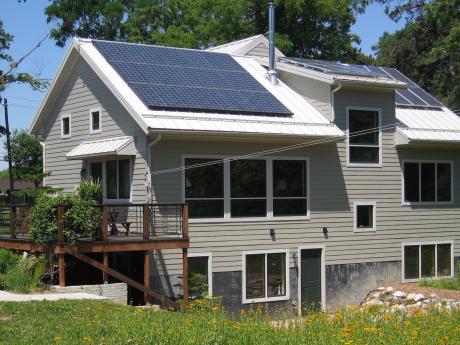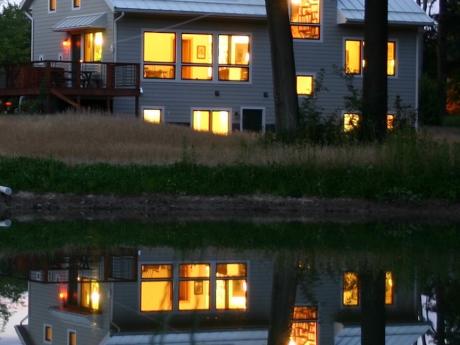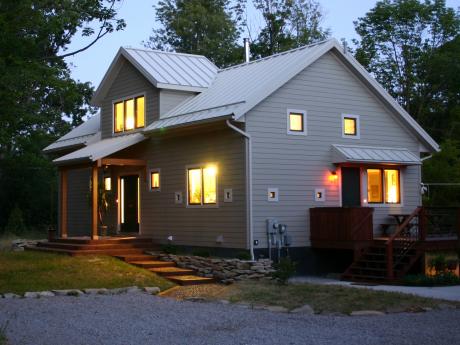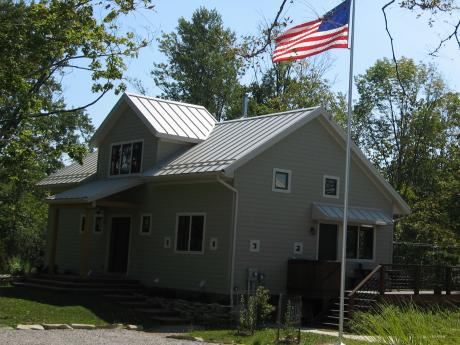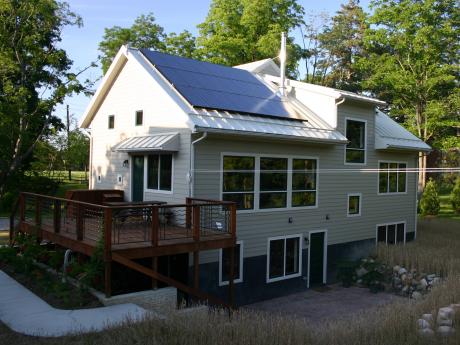Trail Magic
Project Photo Gallery
Project Team
Other Team Members
Donald Watson FAIA, Earthrise, Trumbull, CT; EarthRise001@SBCglobal.net (Schematic Design)
Joseph Ferut, Ferut Architects, Vermillion, OH (detailed design architect and construction overseer)
Michael Strehle, All Seasons Builders, Lorain County, OH (builder)
David N. Borton, 7 Hilltop Road, Brunswick Hills, Troy, NY. (energy consultant)
Mary McDaniel, owner
Carl McDaniel, PhD biologists and owner.
Ratings, Awards and Recognition
My wife, Mary, and I had long admired and wanted to live in a passive solar house similar to the one built in 1981 by our good friends, David and Harriet Borton. We replicated what they did with better materials and added solar produced electricity.
Our goals were to build a modest cost, high-performance, passive-active solar house that conformed to LEED Platinum standards and ran on site sunshine. We employed systems thinking and holistic design decisions to resolve conflicts that arose from the individual perspectives of architecture, beauty and aesthetics, building standards and codes, economics, energy and resource use, and environmentally appropriate construction.
We understood that design and material decisions rarely have one optimal choice, but rather, a preferred choice within the context of the particular project. Our overriding metric, however, was the lifecycle cost measured environmentally and economically with an inclination toward environmental lifecycle costs.
Our behaviors were, and continue to be, critical in making Trail Magic an energy and climate positive home (energy production exceeds energy use and the operation of the house and landscape result in a net reduction of atmospheric heat-trapping gases). We strive with varying degrees of success to use energy and resources only as required for the task at hand.
The detailed story of our project is given in Trail Magic: Creating a Positive Energy Home (Carl N. McDaniel, Sigel Press, 2012). Trail Magic's relevance and relation to similar houses and landscapes is considered in Durable Communities Emerge from Homes and Landscapes Powered by Sunshine, Carl N. McDaniel, Solutions, January-February 2014, Volume 5, Issue 1, www.thesolutionsjournal.org.
Quick Facts
General
| Location | Oberlin, Ohio |
|---|---|
| Building Type | single-family residence |
| Project Type | Zero Energy |
| Basis of Performance Claim | Verified |
| Bedrooms | 4 |
| Bathrooms | 2.5 |
| Conditioned Floor Area | 2,494 sq ft |
| Total Cost of Project | $364,200 |
Energy Summary
| Energy Data Type | Verified |
|---|---|
| Renewable Energy System Type(s) | Photovoltaics |
| Ratings | |
| HERS Index | 27 |
| Energy Star Score | 52 |
| Annual renewable energy generated | 5,200 kWh/year |
Envelope and Mechanicals
| Subslab assembly |
4 inch concrete slab, over 4 inches rigid insulation, over vapor-air barrier, over ~8 inches of stone, over clay subsoil. |
|---|---|
| Foundation wall assembly |
Horizontal section going from outside to inside. Below ground: waterproof membrane on wall to concrete footer, 10 inch-wide Reddi-Wall insulated concrete form, 2.5 inches damp-spray cellulose, 0.5 inch gypsum board. Above ground: stucco finish over welded wire mesh, Tyvek rainwrap, 10 inch-wide Reddi-Wall insulated concrete form, 2.5 inches damp-spray cellulose, 0.5 inch gypsum board. |
| Above grade wall assembly |
Horizontal section going from outside to inside: fiber-cement siding and trim with Tyvek rainwrap on 1/2 inch OSB sheathing, 1 inch of 2-pound closed-cell spray foam vapor-air barrier, double 2 x 4 wall with precut staggered (as possible) studs, 11 inches of damp-spray cellulose insulation, 1/2 inch gypsum board. |
| Door Assembly |
Fiber glass with an R value of 8. When the outside temperature is around 10 degrees F, the inside of the door does not feel cool to the hand. We have 4 doors. |
| Air Changes per hour, ACH50 | 1.10 ACH50 |

